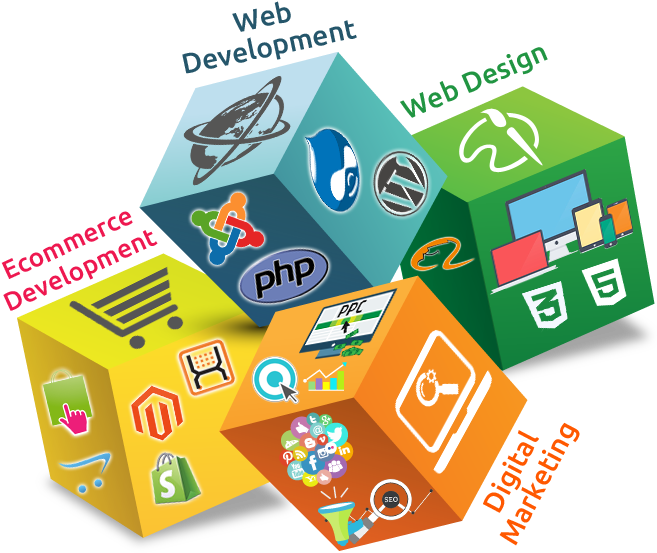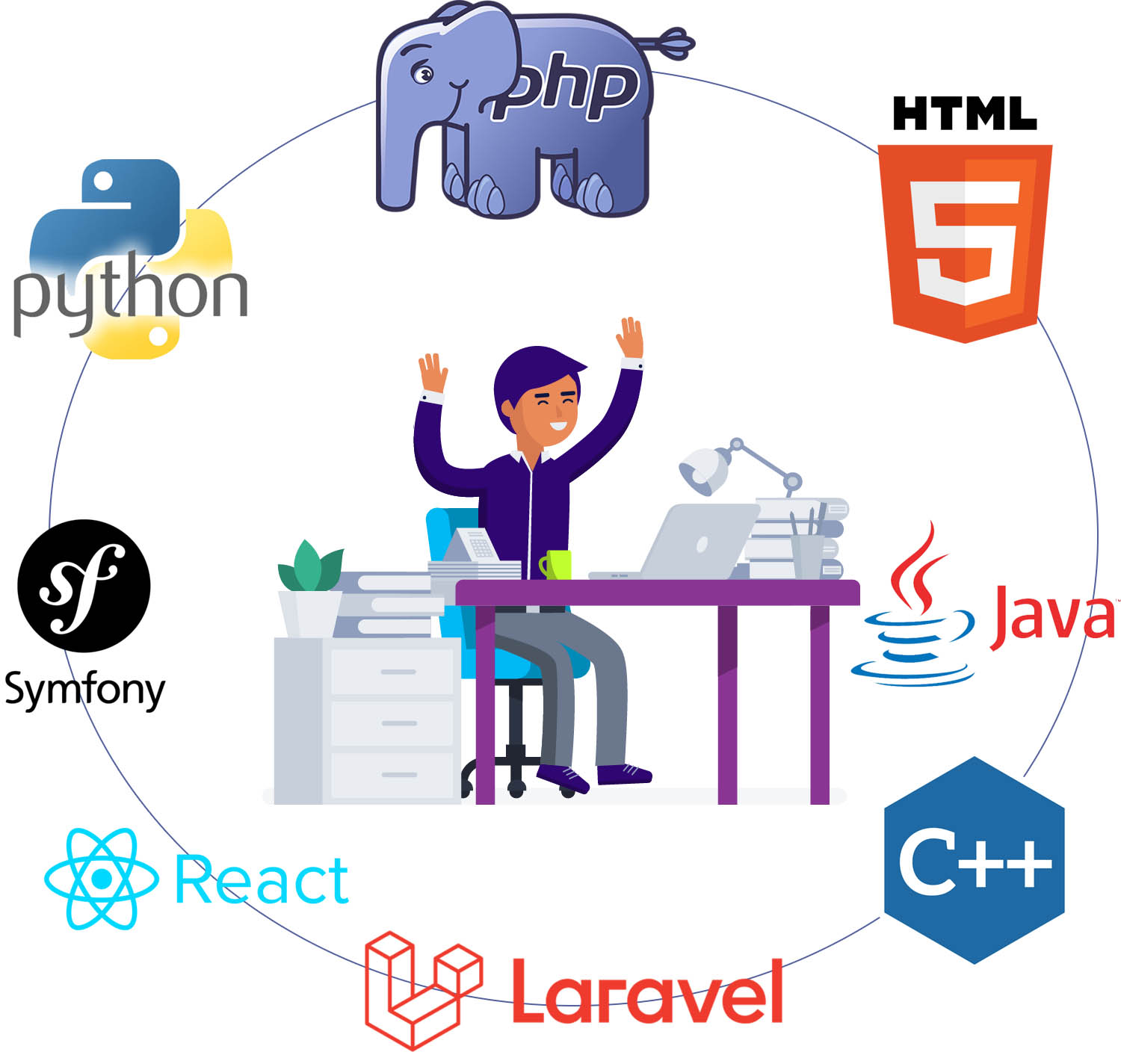what is web development
Guide to Web Development: Everything You Need to Know In 2022Last updated on 01 Jan 2022 by Dezven

Technology has a significant impact on our daily lives, from the most basic uses to innovative inventions. A web developer produced every website or web page we encountered.
It can appear intricate, puzzling, and, to some extent, unreachable to a beginning. As a result, to provide some insight into this exciting field, we've put up a basic introduction to web development and what it takes to become a full-fledged web developer.
This article will go through web development fundamentals in-depth and highlight all of the skills and tools you'll need to get started in this area.
Before making a career in web development, look over the details to see whether it's right for you, and then begin studying the necessary skills.
- What is Web Development?
- Types of Web Development:
- Web Development Process:
- Why web development is important
- Advantages of web development
- Disadvantages of web development
- Web development programming language
- Web development platforms
- Best web development tools
- Cost of Web Development
- Example of Web Development
- Career In Web Development
- Future of web development
- Conclusion
What is Web Development?
Web development means developing a web application or website for end users which is deployed on the internet for user’s interactions.
It not only focuses on designing eye-catching web pages but is mainly concerned with developing code for web application’s functions by using available different programming languages.
Web developers have created every tool we use, from the most basic static site pages to social networking platforms, mobile applications, healthcare, and telecom domain applications.
Types of Web Development
The front-end developers are those who have specialization in user interface (UI) development, back-end developers take care of APIs which are consumed by web applications, and those who are responsible for both roles are part of full-stack web development. Each category lays emphasis on the distinct features of web development, but one feature is common: coding. To have a bachelor's degree in computer science and engineering is the perfect approach to obtain the programming abilities required for a job in web development.

Web developers are masters in designing the appearance of websites. Web development contains three major categories:
1) Front-End Development
It is in charge of a website's appearance. This is responsible for developing web pages of websites and transforming users’ data into graphics with the help of web development languages.
Programming languages such as HTML, CSS and JavaScript are used for this development. Front-end developers watch the latest web design and development, ensuring that web pages are user-optimized.
2) Back-End Development
This kind of web development powers the front-end applications. It provides back-end API code that is consumed by the UI. This code interacts with databases and provides actual data to users. This means that websites transfer data of web pages from the frontend portion to the backend part and vice versa.
Java, Python, C# and C++ are popular programming languages that are used for backend development. Back-end web developers can keep up with technological advancements by joining networking communities that offer coding advice and support.
3) Web Designing
It is the designing of websites that we see across the internet. A web designer leaves no stone unturned to ensure that the web design is user-friendly in layout, appearance, and website content.
A perfectly designed website is aesthetically pleasing, convenient to use, and justifies the website’s brand. You can create a website in two ways: adaptive design or responsive design. A web designer can use both methods to design for desktop or mobile.
4) Database management system
It is a system that stores structured data in a relational table.
RDBMS provides secure data operations such as data insertion, deletion, retrieval, and updating data to the user, client, and application. It efficiently implements ACID properties. Oracle and MySQL are examples of RDBMS.
5) Full-stack Web Development
Full-stack development means developing an end to end functionality that a website requires. This role defines the development of the user interface (UI) and back-end services required by UI.
This kind of developer must specialize at both the front-end and back-end sides; their ability and experience are essential for troubleshooting and speeding up the applications.
Also, full-stack developers frequently work on their set of programming language knowledge that is required of this kind of development. They do so to update their technologies as per market demand and improve websites’ business capabilities.
Web Development Process:
We love to spend plenty of our time surfing the internet. It has made our lives change in so many ways, from the way we think to how we live; all are influenced by it, and websites play a significant role in transforming the way we connect with the world, share and gather information.
The increasing utility of websites has made web development a vital, valuable, and demanding skill set that can be prolific and rewarding.
Web development is the process of implementing web applications. Development work includes developing web pages to web APIs and catchy websites.
- Creating information for the web necessitates focusing on addressing the user's demands. To accomplish this, my methodology consists of six elements and six continuing processes:
- Planning entails defining the target audience, the purpose, the objectives, and the policies that will govern the generation and use of information.
- Analysis: What to develop and how to develop that requires proper analysis. Use validation tools to analyze the web's technological construction, gather information and validate the data per the domain.
- Implementation: Construct a proper code for a website as per the design document by use of available tools and technologies.
- Promotion: To connect the end-users and web users, massive publicity is required. It should match the online community standards and practices to reach the audience.
- Testing, assessment, and focus group stores are used to shift and adapt web content as user needs change, achieving continuous and innovative improvement to suit user demands.
Why web development is important
Web development can play a vital role in education as it can provide information to them more efficiently and effectively. Moreover, learning web development basics at an early age can make students more skillful. The other important aspect of web development is that it proves to be immensely crucial for business as it increases customer reach and credibility with round-the-clock options.
Advantages of web development
- It Connects : Web development facilitates people in expanding reach. It connects one end to another and makes the connection system more effective, efficient, and utilized.
- Efficient Marketing : Web development plays a crucial role in today’s online business world, enabling people to rethink and customize work and provide according to need segmentation.
- Interactive And Attractive: Good web development plays a crucial role in attracting valuable visitors; using essential keywords makes it easy to get visitors and share information in the best possible way.
- Economical: Web application development is very economical. It consists of creating links from the application to a URL.
- No Updates Needed: Web app development does not require any updates. It requires the least maintenance.
Disadvantages of web development
- Internet Connection: Internet connection is a fundamental requirement to browse the website. Moreover, there are some restrictions on specific hardware sometimes.
- Do Not Respond: Sometimes websites and web applications stop responding if they face any issue. Sometimes a website URL takes time to load, making it irritable to some people.
Web development programming language

1) Python
Python is a simple, high-level, human-readable, object-oriented, and interpreter-based programing language. That is used for developing general-purpose modern web applications. Guido Van Rossum is a creator of web developers’ most favourite scripting language.
Python provides a large set of libraries used by data scientists to build their models. It also provides functional as well as structural programming methodology.
What python does?
- It creates web applications.
- It can carry out complex mathematical problems.
- It can connect to both structural and unstructured databases for read-write operations.
- It can maintain its source code easily.
- It provides highly readable syntax.
- Its rich library allows developers to resolve significant problems in a few lines.
- Why is python preferred over other languages?
- Python’s syntax looks like general English language
- It can perform its functions on various platforms like Linux, Windows, Raspberry Pi, Mac, etc.
- Unlike other languages, the developers can write a few line programs because of their syntax.
- Since it runs on an interpreter system, the code gets executed promptly, ensuring quick prototyping.
2) Java
It is a secure and pure object-oriented programming language. It was created by Sun Microsystems and later on acquired by Oracle. Its features of the Java 8 version and later on make it a functional programming language. Its current version is java 17.
Java is mounted on the OOPs concepts. It provides many inbuilt APIs used by web developers to develop enterprise web applications.
Why is java so popular?
- It is platform-independent, which means its byte code can run on any platform.
- Compiler and interpreter-based language.
- Convenient to learn.
- Easy to use.
- Secure and powerful.
- Fast and open-source (doesn’t require a license to operate).
Uses of java:
- Creating Web applications that execute on the server-side.
- Creating standalone or desktop applications such as windows applications.
- Creating distributed enterprise applications such as telecom domain, banking domain, and health domain applications.
- Mobile applications.
- Java provides secure database connections.
- Application servers
- It is similar to C# and C++, so programmers can easily switch between these languages.
3) HTML,CSS
HTML is the acronym of HyperText Markup Language. It is a tag-based structural language used to develop web pages and websites.
Features of HTML
- It can easily format Web pages.
- It describes web page structures.
- It consists of elements that tell your browser how it will display the content.
- It is a basic frontend application which means if you are familiar with HTML, you can easily understand other frontend technologies.
- Its tags are easily untestable and readable.
4) CSS
When it comes to the style of web pages, CSS is the answer. CSS, the Cascading Style Sheet, is developed to style the web pages.
Features of CSS
- It allows web designers to style the HTML tags.
- Widely used styles language.
- It decides how the HTML elements will be displayed on-screen or on paper in any media.
- Since it controls the multiple layouts of various web pages, it helps you save a lot of time.
5) JavaScript
JavaScript is interpreted as a light-weighted programming language. It is a famous object-oriented programming language applied to HTML documents to script web pages.
- It is a syntax-based structural language.
- It is case-sensitive.
- In any JavaScript, you can build Both front-end and back-end applications.
- All web browsers such as Chrome, Safari, and Mozilla Firefox support JavaScript.
6) Net
.NET is a Microsoft-developed open-source framework that provides the platform to develop software applications.
Features of .Net
- It supports several programming languages and editors, which can develop web applications.
- It provides support to almost 60 programming languages such as Python, C#, Visual Basics, F#, Perl, Pascal, etc.
7) PHP
PHP (Hypertext Preprocessor) is an open-source scripting language mounted over the HTML to create server-side web applications.
Features of PHP
- It is a scripting language that interacts with databases.
- It provides dynamic nature content to web pages.
- It is a faster scripting language.
Web development platforms
1) Word press
Word press is the most frequently used platform to host and build websites. It has around 62 programming languages to use. Word press also has numerous customisation options, templates, etc., to customise a website that fits that purpose.
2) Wix
It has a free, user-friendly and famous platform for web development. It is self-explanatory and has built-in features that allow users to design websites easily. You can avail the services at Wix’s web hosting platform just by adding an email. It is advantageous to use Wix because it lets you sell unlimited physical, digital, or service-based products.
3) Weebly
This web hosting service consists of a drag-and-drop functionality and allows users to build a website with a responsive web page. It can add more features to the website according to the requirement.
Best web development tools
1) Github
It is an open-source repository where the developers store their code. It allows multiple people to make different changes simultaneously to a web page. Teams collaborate to make and edit content at their websites.
2) Codepen
It is a popular online community that tests and showcases code snippets of HTML, JavaScript, and CSS, created by users. These code snippets are called ‘pens.’
It functions as an open-source for the learning environment and as the perfect code editor.
3) Jquery
It is a small, feature-rich, and fast library of javascript. It makes ajax, event handling, animation, and HTML documentation much more straightforward. It is possible because Jquery uses a user-friendly API working for multiple browsers.
4) Bootstrap
It is an open-source,user-interface framework of CSS. It is used for the development of mobile-first and responsive websites.
5) NPM
It is the acronym for the Node Package Manager. It is the biggest software library globally, containing approximately 800,000 packages of codes.
Organizations make use of NPM to handle private development.
6) Chrome dev tools
These are the set of tools for debugging and web authoring built into google chrome. You can edit the web pages instantaneously. Moreover, these development tools help diagnose problems quickly and build websites faster.
7) Visual studio code
It is a standalone source-code editor invented by Microsoft and is used for Linux, Windows, and macOS. It has umpteen attractive features like syntax highlighting, code refactoring, embedded Git, snippets, etc.
Cost of Web Development
Assume you're building your dream home, and you're wondering, "How much does it cost to build a house?" Well, the cost varies, based on your house’s styling, location, area, total rooms, etc. This exactly is applicable for web designing.
So, how much will website development cost in 2022? A variety of criteria will determine the answer.
But don't worry, we have listed down the estimate and cost to establish websites.
According to web studies, it costs from $1,000 to $95,000 to create and design a simple or complex website.
In terms of actual cash, building a small business website could cost less than $1,000 or more than $10,000.
Development of a moderate to the complex website might cost from $2,500 to $95,000. You may have to pay considerably more to create a complicated custom website.
Example of Web Development
1) Google Sheets
Google provides the office suite, one of the best examples of web applications. Google Docs provides a multipurpose and multi-user interface that allows users to write their content on the drive. Later, users can share them with colleagues and export them to local machines in PDF, word and excel format.
Also, Google Docs allows users to work offline. The work gets automatically saved on the drive when the user connects to the internet.
2) Codepen.io
It is a marvelous tool designed for users dipping their toes in web development marketing. It helps developers test their web application languages code such as HTML and CSS online.
We can test the code, amend it, and store it on the drive. Moreover, we can share the code with the same tool community.
Career In Web Development
The career in web development is bright because there are various jobs in the web development area. It is because there are multiple forms of web development.

Jobs in web development
1) Web Designer
A web designer (sometimes known as a digital designer) is in charge of the look and feel of a website. They should have a design, art, and coding skills and an awareness of best practices for creating a functional, beautiful site and effective at attracting users. To create their websites, web designers use several graphic design software applications. According to PayScale.com data from April 2021, the median starting web designer income is around $43,000 per year; with experience, the median salary is around $60,000 per year.
2) Web Developer
A web programmer or web developer is the one who writes the code that makes a website work. Web programmers are frequently familiar with web design concepts because they make the user interface pleasant to site visitors. As per PayScale.com April 2021, the income for web programmers is approximately $49,000 annually. However, experienced developers can earn around $64,000 per annum.
3) Content Creator
A web content developer creates the website's content like blog entries, news items, photos, videos, and product descriptions. Content developers can also do programming like HTML and search engine optimization (SEO). According to sources, a content creator can make up to $50,000 annually.
Future of web development
The Internet is not going away. The future of web development is growing better by the day, and web developers are at the forefront of these advancements and breakthroughs. Web development influences practically every aspect of your day, and your business, from this blog to your favorite social network to the apps on your phone.
Take the time to learn about coding and programming to better your life and the lives of your clients.
Conclusion
The job opportunities in web development are replacing traditional jobs. So gear up, gain expertise and get the terrific chance to remain employed.
Since the technology is covering almost all the fields, don’t contemplate, just join this exciting industry and build your bright future.

- Most popular CSS frameworks
- Most Popular Website Builders
- what is full stack development
- What is the difference between web designer and web developer
- What is the difference between backend and frontend development
- What is backend developer
- What is Web Developer
- Best ecommerce website builder In 2022
- What is web designer
- What is Web Designing
- Best Javascript frameworks for web development
- What Is The Difference Between Web Designing And Web Development
- What is Front end Developer
- What is Backend Development
- Most Popular PHP Frameworks to Use in 2022
- Best web development languages